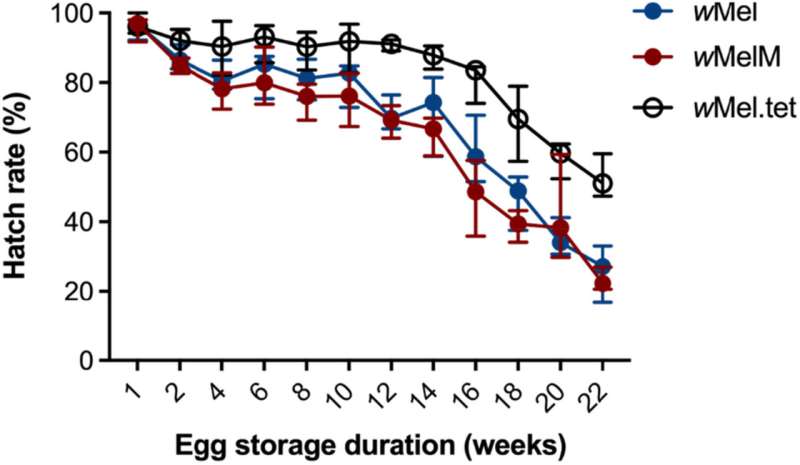Dengue-blocking mosquitoes here to stay

Dengue fever and other mosquito-borne diseases remain a massive threat to human health and well-being. Urbanization and climate change are likely to increase this threat as established mosquitoes spread to new environments and gain a foothold.
Eradicating all disease-spreading mosquitoes isn't possible, but we might be able to do the next best thing. For the last decade, we've been using bacteria called Wolbachia to reduce the ability of mosquitoes to spread the dengue virus.
Wolbachia to the rescue
Wolbachia lives inside the cells of about half of all insect species. The bacteria can have a variety of effects on their hosts, from providing essential nutrients to killing male offspring. When transferred to mosquitoes, the bacteria reduce the ability of many viruses to replicate inside the mosquito and be passed on to a human host.
Mosquitoes with Wolbachia have now been released around the world, with dramatic effects on dengue transmission. In Australia, local dengue transmission is a thing of the past thanks to widespread Wolbachia mosquito release programs.
Wolbachia can remain at very high levels in mosquito populations because it is passed from females to all their offspring.
Although males that carry Wolbachia can't pass the infection on, any female mosquitoes they mate with that lack Wolbachia won't produce offspring. This gives any unlucky mosquitoes that don't have Wolbachia a big disadvantage. So by introducing dengue-blocking Wolbachia to the local mosquito population, most mosquitoes that survive are unlikely to pass on the dengue virus.
How long will Wolbachia releases be effective?
For Wolbachia releases to be sustainable, it's important that the bacterium remains at high levels in the mosquito population and provide ongoing protection against dengue. Our study published earlier this year in PLoS Pathogens finds remarkable long-term stability of Wolbachia.
We monitored mosquito populations a decade after the first release of Wolbachia in Australia and found that its effects on mosquitoes remained intact. Furthermore, there were no detectable changes in the genome of Wolbachia.
Our research suggests that Wolbachia is likely to be effective for a very long time, but ongoing monitoring remains crucial to detect unexpected changes.
A Wolbachia strain for every situation
We have developed new Wolbachia strains using a technique called microinjection, where Wolbachia is sucked out of an egg carrying the strain of interest and injected into a donor mosquito egg. If you're lucky, the mosquito that hatches will pass on the Wolbachia to their offspring.
The wMel strain is being used widely in Wolbachia release programs, but it's vulnerable to high temperatures. This means that Wolbachia could drop out of mosquito populations during the hotter parts of the year and might be unsuitable for release in some climates altogether.
In a new study published this week in Environmental Microbiology, we transferred a new variant of wMel, which we call wMelM, from its original vinegar fly host to mosquitoes. We found that wMelM is more stable than wMel at extreme temperatures, potentially improving its ability to spread in natural populations.
This work along with a new preprint on another Wolbachia strain called wAlbB highlights the diversity in Wolbachia phenotypes, even when there are only small genetic differences.
In another recent paper published in Applied and Environmental Microbiology, we used microinjection and crosses to transfer wAlbB Wolbachia to both Australian and Malaysian mosquitoes.
Although Australian and Malaysian mosquitoes have distinct differences, the effects of Wolbachia were consistent in both groups. This provides confidence that Wolbachia releases will have similar outcomes in different mosquito populations, but it's also important to consider the impact of local environmental conditions.
Beyond Wolbachia
Wolbachia is one of many types of bacteria that could be used to modify or control insect pests for our benefit.
Our new research is targeting endosymbionts living within aphids to reduce the damage they cause to crops. We are also looking beyond the mosquito species that transmit dengue to tackle local threats in Australia.
Japanese encephalitis, Ross River virus and the Buruli ulcer are among many nasty pathogens spread by mosquitoes here, and all of them could potentially be controlled with Wolbachia release programs.
As mosquito-borne diseases continue to spread globally, we urgently need new tools to tackle these threats—Wolbachia and other microbes may be our best bet.
More information: Perran A. Ross et al, A decade of stability for wMel Wolbachia in natural Aedes aegypti populations, PLOS Pathogens (2022). DOI: 10.1371/journal.ppat.1010256
Xinyue Gu et al, A w Mel Wolbachia variant in Aedes aegypti from field‐collected Drosophila melanogaster with increased phenotypic stability under heat stress, Environmental Microbiology (2022). DOI: 10.1111/1462-2920.15966
Julien Martinez et al, Genomic and phenotypic comparisons reveal distinct variants of Wolbachia strain wAlbB (2022). DOI: 10.1101/2022.02.25.482065
Perran A. Ross et al, A w AlbB Wolbachia Transinfection Displays Stable Phenotypic Effects across Divergent Aedes aegypti Mosquito Backgrounds, Applied and Environmental Microbiology (2021). DOI: 10.1128/AEM.01264-21
Journal information: Environmental Microbiology , PLoS Pathogens , Applied and Environmental Microbiology
Provided by University of Melbourne




















